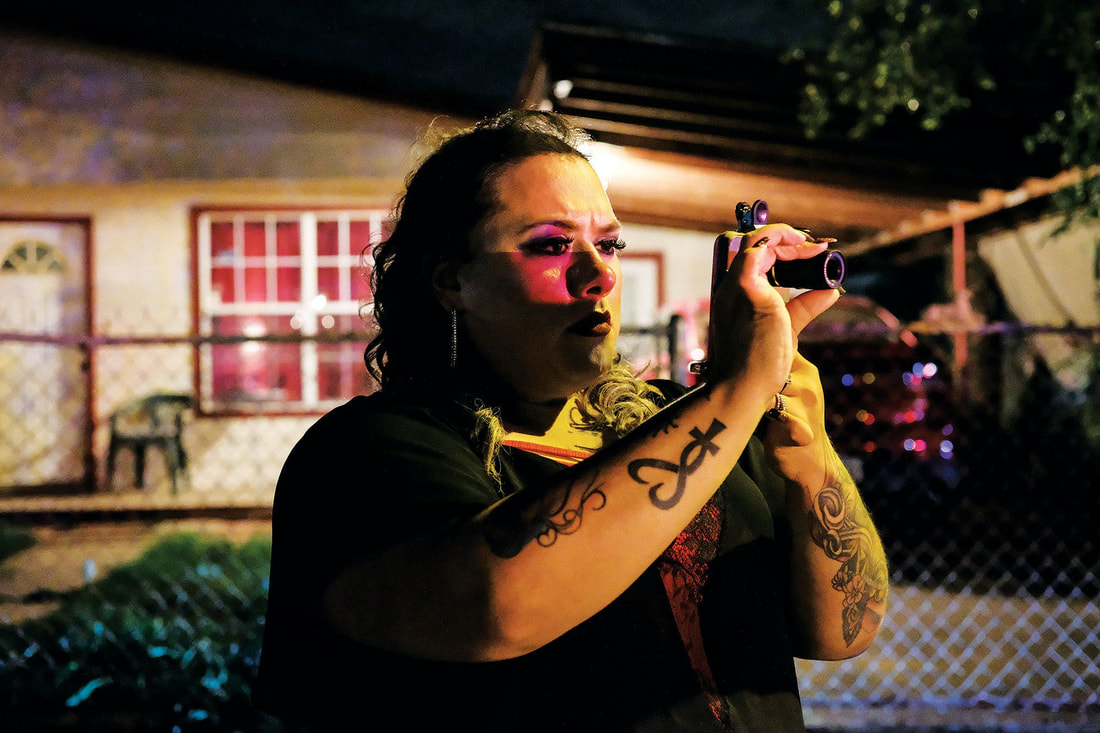|
Priscilla Villarreal is a citizen journalist who uses her cell phone to live-stream videos of traffic accidents and crime scenes. Known on Facebook as Lagordiloca (“the big, crazy lady”), Villarreal has managed to crawl under the skin of local law enforcement.
She live-streamed Laredo Police Department officers choking an arrestee during a traffic stop. She criticized the Webb County District Attorney for not charging a relative of one of its prosecutors, despite evidence that the relative had abused animals. When she recorded a crime scene from behind a barricade, an officer threatened to confiscate her phone – while ignoring members of the traditional media standing next to her. In April, 2017, Villarreal posted a story about a U.S. Border Patrol agent who had committed suicide. A month later, she posted the last name of a family involved in a fatal car crash. In both instances, she had confirmed her information with a Laredo Police Department officer, just as any journalist would. Six months later, Villarreal was arrested and charged with two third-degree felony counts for violating a Texas statute outlawing “Misuse of Public Information.” The affidavit in support of the arrest warrant said she had published “nonpublic” information. After turning herself in, Villarreal was followed in the booking process by police officers who mocked her and took pictures of her in handcuffs. The statute in question largely deals with public officials who use inside information for their own benefit. The “benefit” that private citizen Villarreal was charged with illicitly seeking was attracting more followers to the then-120,000 audience for Lagordiloca. By this logic, a similar “benefit” could be construed from any story that brings followers, watchers or readers to a commercial media news outlet. A district court dismissed Villarreal’s First, Fourth and Fourteenth Amendment claims for her defense and rejected her right to seek redress. On Nov. 1, Judge James Ho of the 5th Circuit of Appeals reversed this ruling. His findings should be printed and posted in every police station in the United States. If the First Amendment means anything, it surely means a citizen journalist has the right to ask a public official a question, without fear of being imprisoned. Yet that is exactly what happened here: Priscilla Villarreal was put in jail for asking a police officer a question. If that is not an obvious violation of the Constitution, it’s hard to imagine what would be. Judge Ho went on to address the district court’s next mistake, which prevented Villarreal from pursuing a wrongful arrest claim. And as the Supreme Court has repeatedly held, public officials are not entitled to qualified immunity for obvious violations of the Constitution. The district court accordingly erred in dismissing Villarreal’s First and Fourth Amendment claims on qualified immunity grounds. The district court also erred in dismissing her Fourteenth Amendment claims for failure to state a claim. This case should resonate on Capitol Hill, where Rep. Jamie Raskin and Sen. Ron Wyden have introduced the Protect Reporters from Exploitive State Spying (PRESS) Act. This bill would create a federal statutory privilege to protect journalists from being compelled to reveal confidential sources and prevent federal law enforcement from abusing subpoena power. Though the PRESS Act addresses different issues than the ones at the heart of the Villarreal case, debate about the role of the press should be informed by the need to offer wide protections to citizen journalists. While law enforcement in Laredo comes to terms with the law – and the likelihood they will be sued – they should also contemplate the law of unintended consequences. Since her arrest, Lagordiloca has added another 70,000 followers. Comments are closed.
|
Archives
June 2024
Categories
All
|
ABOUT |
ISSUES |
TAKE ACTION |



 RSS Feed
RSS Feed